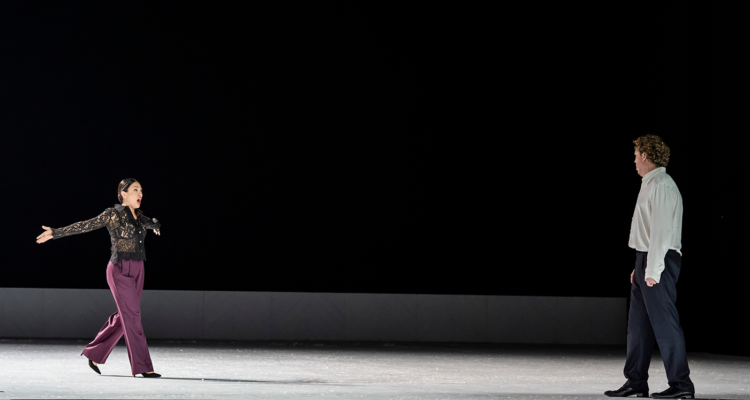Eugene Onegin tells the tale of the Larin sisters—Tatyana, a romantic dreamer, and Olga, a playful flirt—living on their estate. When Olga’s fiancé, Lensky, arrives with his friend Onegin, Tatyana falls in love and sends Onegin a heartfelt letter. However, he rejects her. At a dance, Onegin flirts with Olga, enraging Lensky, who challenges him to a duel, leading to Lensky’s death. Years later, Onegin, at a ball in St. Petersburg, meets Tatyana, now married to Count Gremin, and falls in love with her. Though she still has feelings for him, she rebuffs him.
In American director Ted Huffman’s much-anticipated production, the intent was to incorporate more of Pushkin’s voice. However, it proved to be a significant letdown. Can a production truly be called such when it features nothing more than a black backdrop, two chairs, and a table? The lack of set design and the drab costumes suggest cost-cutting measures. Additionally, many important moments occur at the far edges of the stage, making it hard for a large portion of the audience to engage fully.
The party scene, which should have evoked the liveliness of a Russian cotillion, fell short, with only a few couples dancing briefly. Much of this was obscured by the chorus, especially for those seated downstairs. Similarly, what should have been a grand spectacle in the Polonaise at Gremin’s ball devolved into scattered, unremarkable dancing, leaving the audience disinterested.
Rather than staying faithful to Pushkin, Huffman alters several crucial scenes. The opening harvest celebration feels hollow without a festival. Olga, usually a secondary character, is given more prominence—working in some scenes but jarring in others. For example, in the final scene, Olga plays with Tatyana’s children, with no memory of Lensky, whose ghost haunts the background. This revision works well, but others, like Olga writing Tatyana’s famous letter as her secretary, or her sleeping with Onegin before the duel, do not. The duel scene itself is frustratingly staged far to the right, leaving many in the audience unable to see Lensky shoot himself after Onegin refuses to duel. Triquet’s frequent reappearance as a clown feels unnecessary and out of place.
With such minimal production value, the burden falls entirely on the singers. Unfortunately, without proper staging or acoustics, voices often get lost in the vast, empty space, forcing performers to sing toward the front, creating the feel of a concert rather than an opera.
Musically, the evening begins promisingly with a beautiful quartet sung by British mezzo-soprano Alison Kettlewell (Larina), Kiwi mezzo Rhonda Browne (Filipyevna), Russian soprano Kristina Mkhitaryan (Tatyana), and American contralto Avery Amerau (Olga). Amerau’s rich, creamy voice is well-suited to her role.
However, Mkhitaryan’s portrayal of Tatyana during the letter scene—one of the most personal and pivotal moments—falls flat. Instead of capturing the intimacy and vulnerability of Tatyana pouring her heart out, the scene is distracted by unnecessary action, with Olga dictating parts of the letter and the two of them awkwardly kneeling on the floor. This breaks the dramatic focus, robbing the scene of its emotional core. Mkhitaryan redeems herself somewhat in the later scenes, showing greater depth and sensitivity.
Armenian tenor Liparit Avetisyan shines as Lensky, delivering a stunning performance with beautiful phrasing, excellent breath control, and nuanced use of the Russian language. His aria “Kuda, kuda vy udalilis” (Where have you gone?) is a highlight, earning a well-deserved ovation.
On the other hand, Canadian baritone Gordon Bintner’s Onegin is cold and wooden, evoking little sympathy. His voice lacks warmth and tonal depth, often sounding tight, particularly in the upper registers. Compared to the legendary Dmitri Hvorostovsky, Bintner falls short in conveying the complexity of Onegin’s character.
British bass Brindley Sherratt is a standout as Count Gremin, stepping in as a last-minute replacement and delivering an outstanding performance with his powerful bass.
Overall, Huffman’s vision undermines the strengths of Pushkin, Tchaikovsky, and the singers. The production, marred by poor staging choices and a lack of emotional depth, fails to do justice to this beloved opera.
Royal Opera House, Covent Garden
Music by Piotr Ilyich Tchaikovsky
Libretto by Piotr Ilyich Tchaikovsky and Konstantin Stepanovich Shilovsky after the verse novel by Alexander Sergeyevich Pushkin
Conducted by Henrik Nànàsi
Directed by Ted Huffman
First performance 29th March 1879, Maly Theatre, Moscow.
Cast includes Gordon Bintner, Kristina Nkhitaryan, Liparit Avetisyan, Avery Amereau, Brindley Sherratt, Alison Kettlewell, Rhonda Brown, Christophe Mortagne.
Running time 2 hours 50 minutes with one interval
Until: 14th October 2024
Photo Credit Marc Brenner

